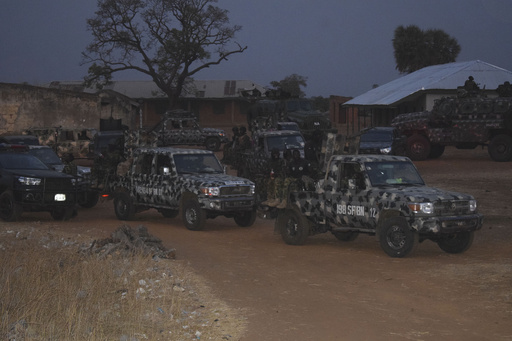ABUJA, Nigeria (AP) — Security forces swept through large forests in Nigeria’s northwest region on Friday in search of nearly 300 children abducted from their school by motorcycle-riding gunmen in the latest mass kidnapping, which analysts and activists blamed on the failure of intelligence and a slow security response.
The abduction of the 287 children in Kaduna state, near the West African nation’s capital, is one of the largest school kidnappings in the decade since the kidnapping of schoolgirls in Borno state’s Chibok village in 2014 stunned the world. Analysts and activists say the security lapses that allowed that mass abduction remain.
The victims of the latest attack — among them at least 100 children aged 12 or under — were surrounded and marched into a forest just as they were starting the school day, said locals in Kuriga town, located 55 miles (89 kilometers) from the city of Kaduna. One man was shot dead as he tried to save the students, school authorities said.
As Kaduna Gov. Uba Sani and security officials met with aggrieved villagers on Thursday, they pleaded with the governor to ensure the release of the students and secure their town — like many in the area, once a bustling agrarian community but now sparsely populated and where roads are often avoided because of rampant kidnappings.
“Please stay and help us, please don’t leave us,” one woman cried as the governor’s convoy sped off.
Kaduna police spokesman Mansur Hassan told The Associated Press that a search operation is taking place in the nearby forests, which often serve as enclaves for armed gangs. “All the security agencies are trying their best to ensure the rescue of the children,” Hassan said.
The school, which had no fencing, was “surrounded from all angles” by the gunmen who arrived on motorcycles just after 8 a.m., said Joshua Madami, a youth leader in the area.
Security forces did not arrive at the scene until several hours later, locals said, prompting concerns from families and analysts that the gunmen might have gone deep into the forest with the children.
Confidence MacHarry, a security analyst with the Lagos-based SBM Intelligence firm, said such delayed response is common and worsens the situation in hotspots, in addition to the failure to act on intelligence.
“I am confident that the victims will be rescued,” said Nigerian President Bola Tinubu, who was elected last year after promising to end the country’s kidnapping crisis. “Nothing else is acceptable to me and the waiting family members.”
No group has claimed responsibility for the attacks but locals blamed it on the bandits who carry out frequent mass killings and abductions for huge ransoms in remote villages across Nigeria’s northwest and central regions.
The bandits are mostly herders who had been in conflict with host communities. They are different from the Islamic extremist rebels who had abducted more than 200 people, mostly women and children, in recent days.
School abductions across northern Nigeria have reduced since early last year but the structural conditions enabling them have remained, said James Barnett, a researcher specializing in West Africa at the U.S.-based Hudson Institute. The bandits, he said, have focused on consolidating their influence over rural communities, often in the form of levies.
“Since the start of the year, we’ve seen the bandits being more aggressive,” said Barnett. “This attack may be an attempt by some of the gangs to signal to the government that they can turn back the clock to 2021, when mass kidnappings led to a wave of school closures across the northwest.”
This website uses cookies so that we can provide you with the best user experience possible. Cookie information is stored in your browser and performs functions such as recognising you when you return to our website and helping our team to understand which sections of the website you find most interesting and useful.
